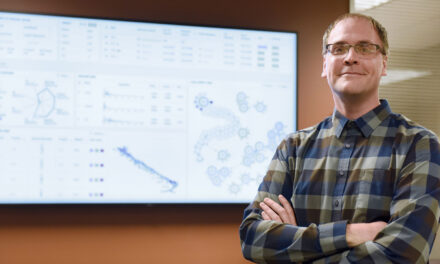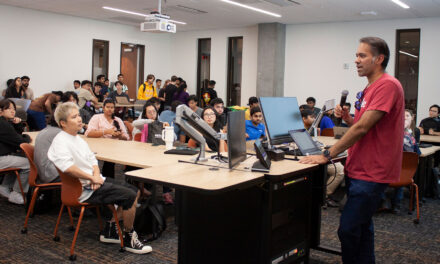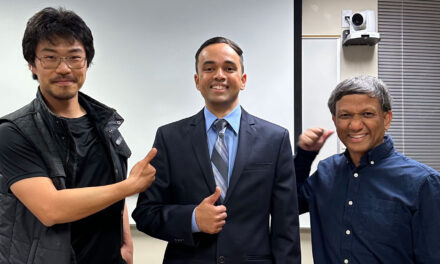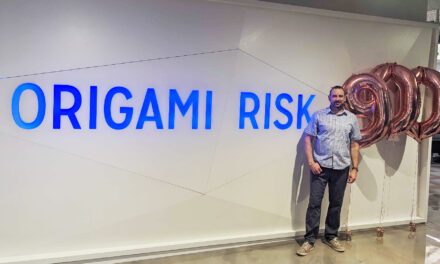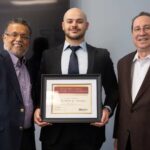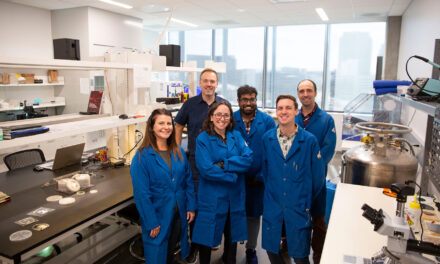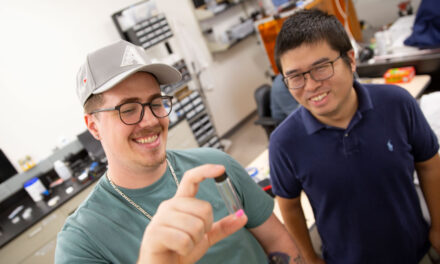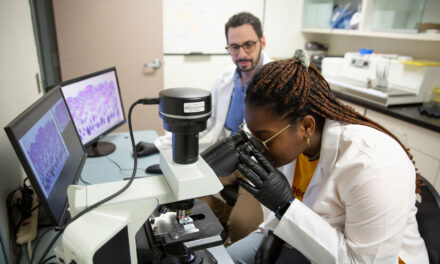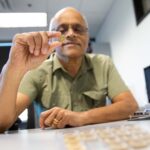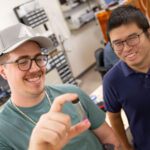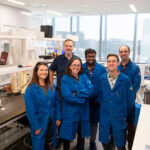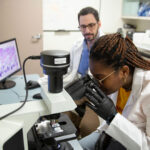
ASU engineer earns medal of merit from Macedonian president
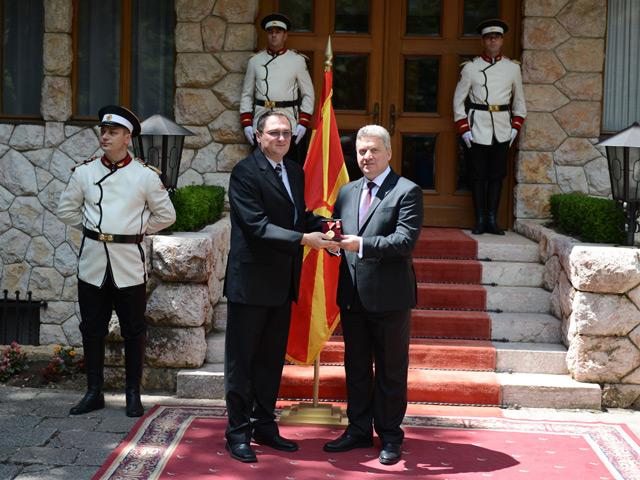
Kiril Hristovski (left) was presented a Medal of Merit for Macedonia on July 20, 2016 by Macedonian President Gjorge Ivanov during a ceremony at the Presidential Villa Biljana in Ohrid, Macedonia. Photographer: Aleksandar Atanasov, courtesy of the Macedonian president’s office
An Arizona State University engineer has a knack for earning awards from Heads of State.
In 1991, as a high school student in the United States, Kiril Hristovski earned an award from President George H. W. Bush for outstanding academic achievement and excellence in the presidential academic fitness program.
Now 25 years later, Hristovski received a Medal of Merit for Macedonia, the highest recognition a civilian can earn from the government of Macedonia.
Hristovski was presented the award on July 20, 2016 by Macedonian President Gjorge Ivanov during a ceremony at the Presidential Villa Biljana in Ohrid, Macedonia.
“The same intense emotions, though mixed with nostalgia, came back during the ceremony in Ohrid,” said Hristovski, an associate professor in environmental engineering and management at the Polytechnic School in ASU’s Ira A. Fulton Schools of Engineering.
He was the only representative from the Americas, and among four recipients, including two Macedonian poets and a humanitarian devoted to improving Macedonian communities and diplomacy in Serbia.
The award recognizes contributions to the preservation and affirmation of the historical and cultural traditions of Macedonia, Hristovski’s country of origin.
President Ivanov recognized Hristovski during the ceremony for his contributions in nanotechnology, calling it “the big theme for the smallest things.” The president complimented him for his academic and scientific achievements, and for being a positive example for young scientists.
“I expect many to follow him in engaging in the global competition of knowledge, ideas and technology,” said President Ivanov.
Environmental research in Macedonia
Hristovski has long tackled research related to environmental issues in Macedonia. This research has resulted in the publication of scientific papers in several fields, including solid waste, water resources and environmental management.
The latest paper, recently published in the International Water Association’s Journal of Water and Health, examines potential health and emergency management implications from climate change and water resources depletion in Macedonia by analyzing empirical data sets collected over a period of 50 years.
Hristovski’s findings suggest decreases in available water quality and resources, while predicting increases in local temperatures, frequency of extreme weather events and water-related health outbreaks. The paper also reveals that the existing emergency management system in Macedonia is not prepared to adequately respond to the anticipated gloomy scenarios caused by climate change.
“Unfortunately, our grim predictions became reality in last week’s extreme weather event,” said Hristovski, referencing the thunderstorm in Skopje, Macedonia, which caused flash flooding that claimed the lives of more than 20 people, and threatened the existing potable water sources.
“We are hopeful that our findings will initiate reforms in the Macedonian environmental and emergency management systems — leading to improved resiliency and better responses to future anthropogenic or climate change induced emergencies,” said Hristovski. His colleagues at ASU are open to collaborating with and assisting the Macedonian institutions to ensure a safer future for the country.
Besides his expertise in the areas of management and quality of water, solid and hazardous waste, and emergency situations, Hristovski is a leader in applying nanotechnology and nanomaterials to the purification of water resources.
His research team is working on new technologies using nanomaterials that will enable more efficient water treatment devices that are smaller, and more sustainable, economical and flexible. This includes the development of hybrid nanomaterials, which can remove arsenic and other contaminants from the water
“Many countries do not have well developed infrastructure for treatment and transport of water, especially in rural areas, such as Macedonia,” said Hristovski. These areas could greatly benefit from treatment technologies based on nanomaterials.
Hristovski has more than 40 scientific papers and several patent applications in this area.
Fostering international collaboration
The award not only recognizes Hristovski’s achievements in his field, but also his role as an ambassador for Macedonia.
Speaking of the recipients’ accomplishments, President Ivanov said, “Every success is your success for Macedonia.”
In 2001, as a young chemical engineer, Hristovski left Macedonia to pursue master’s and doctoral degrees at ASU. After graduation he stayed at the university to continue his successful career as a faculty member.
“As a professor at the largest university in the United States, I have the opportunity to promote the Macedonian culture, language, history and nation not only through direct contacts and discussions with colleagues and students from around the world, but also through my teaching and research,” said Hristovski
Hristovski hopes to raise the quality of science and engineering education in his country of origin by “creating bridges of cooperation” between Macedonian and Arizonian universities.
In 2013, Hristovski initiated a collaboration between ASU and the Macedonian military academy “Mihailo Apostolski” based in Skopje, which resulted in an official Memorandum of Understanding for collaboration between the two institutions. A year later, this effort led to the establishment of a similar platform for collaboration with the state university “Goce Delcev” in Stip, Macedonia.
Several joint papers and a research proposal have already come out of these collaborations, and several others are in the final stages of preparation before submission.
Hristovski says this recognition is “a great motivator for expanding ASU’s collaboration with institutions in Macedonia and across the world.”
Media Contact
Rose Serago, [email protected]
Ira A. Fulton Schools of Engineering



